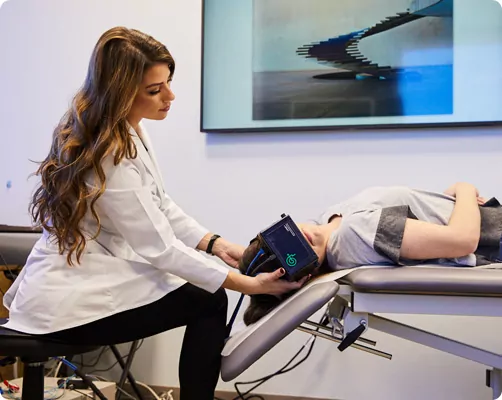Is Treatment Proper for Your Vertigo? Listed here is What Specialists Say
Is Treatment Proper for Your Vertigo? Listed here is What Specialists Say
Blog Article
Vertigo is really a common condition that influences huge numbers of people worldwide. It is indicated by way of a experience of dizziness, rotating, or sensation off-balance. While vertigo can be caused by numerous factors, determining the main cause is vital in determining the top therapy plan. In this post, we will discuss why it is important to spot the what causes vertigo efficient therapy and how it can improve your general quality of life.

Vertigo can be brought on by many facets such as for instance internal hearing problems, mind incidents, migraines, and also specific medications. Without understanding the basis cause of your vertigo signs, it may be difficult to get a suitable treatment which will give long-term relief. For example, if your vertigo is due to an interior hearing issue but you're recommended treatment for migraines alternatively, may very well not experience any development in your symptoms.
Identifying the explanation for vertigo needs a complete evaluation from the medical professional. This might include bodily exams and diagnostic tests such as body function and imaging scans to exclude any underlying problems or injuries that may be causing your symptoms. After the trigger has been identified, a customized treatment program could be made to deal with your unique needs.
One reason determining the explanation for vertigo is crucial for successful therapy is really because various causes require various methods in handling symptoms. Like, if your vertigo is a result of an interior head issue named benign paroxysmal positional vertigo (BPPV), particular exercises known as canalith repositioning maneuvers might help reduce symptoms. But, these workouts wouldn't be beneficial if your vertigo was brought on by another thing like vestibular neuritis.
Moreover, managing just the symptoms without approaching their root cause may lead to temporary relief however, not long-term development in general health and well-being. For instance, getting treatment to alleviate vertigo indicators brought on by an internal hearing issue may give temporary reduction, but it generally does not handle the main issue. This can lead to recurring attacks of vertigo and a diminished quality of life.
Identifying the reason for vertigo can be important in stopping potential episodes and managing any potential complications. For instance, if your vertigo is the effect of a head harm, distinguishing it early on can prevent further injury and enable appropriate therapy to be administered promptly.

Conclusion: In summary, distinguishing the reason for your vertigo is needed for efficient therapy and overall well-being. It makes for a personalized strategy that addresses the root trigger relatively than simply managing symptoms. With proper diagnosis and therapy, you are able to experience long-term rest from your symptoms and enhance your quality of life significantly. If you are experiencing frequent episodes of vertigo and other connected symptoms, don't wait to find medical interest to ascertain the underlying cause and get proper treatment.
________________________________________
Is Treatment Proper for Your Vertigo? Here's What Specialists Say
===============================================
Vertigo is really a common issue that influences thousands of people worldwide. It's characterized with a feeling of dizziness, spinning, and loss of balance. While there are various triggers for vertigo, it can be debilitating and considerably affect one's quality of life. Luckily, you will find drugs available to greatly help alleviate the outward symptoms and give reduction for anyone experiencing vertigo. In this post, we shall examine the several types of vertigo medication reduction and why they work.

Probably the most commonly recommended medication for vertigo is called Meclizine (Antivert). This treatment belongs to a type referred to as antihistamines which perform by blocking histamine receptors in the mind in charge of causing dizziness and nausea. Meclizine has been discovered to work in lowering indicators such as for example dizziness, vomiting, and nausea associated with vertigo. It is generally taken 1-4 instances daily depending on the severity of symptoms.
A different type of medicine applied to deal with vertigo is known as Benzodiazepines (Valium or Ativan). These medications behave on particular neurotransmitters in mental performance that regulate harmony and coordination. They've been discovered to be effective in reducing feelings of dizziness and panic related to vertigo. However, these medicines could cause drowsiness
as a complication therefore they should be combined with caution.
Sometimes where other drugs haven't presented reduction or if there are underlying problems producing vertigo such as for example Meniere's disease or vestibular migraines, doctors may possibly prescribe diuretics like hydrochlorothiazide (HCTZ) or acetazolamide (Diamox). These drugs work by reducing liquid buildup in the inner hearing that may subscribe to attacks of vertigo.
For those who knowledge extreme bouts of vertigo that not react properly to different drugs, health practitioners may prescribe steroids such as for example prednisone. These medications function by lowering inflammation in the internal hearing which could cause vertigo. However, they're usually prescribed for short-term use as a result of possible side effects.
As well as these drugs, doctors may also recommend vestibular rehabilitation therapy (VRT) for long-term relief from vertigo symptoms. VRT is a questionnaire of physical treatment that targets workouts and practices to boost stability and minimize dizziness. It has been found to work in handling vertigo symptoms and improving over all quality of life.

Conclusion: While there is no one-size-fits-all method when it comes to managing vertigo, medicines can provide significant comfort for those struggling with this condition. Meclizine, Benzodiazepines, diuretics, steroids, and VRT are commonly prescribed possibilities which were discovered to work in handling vertigo symptoms. It is important to consult with a physician before beginning any medicine regimen as they are able to establish the very best length of therapy predicated on individual wants and medical history. Report this page